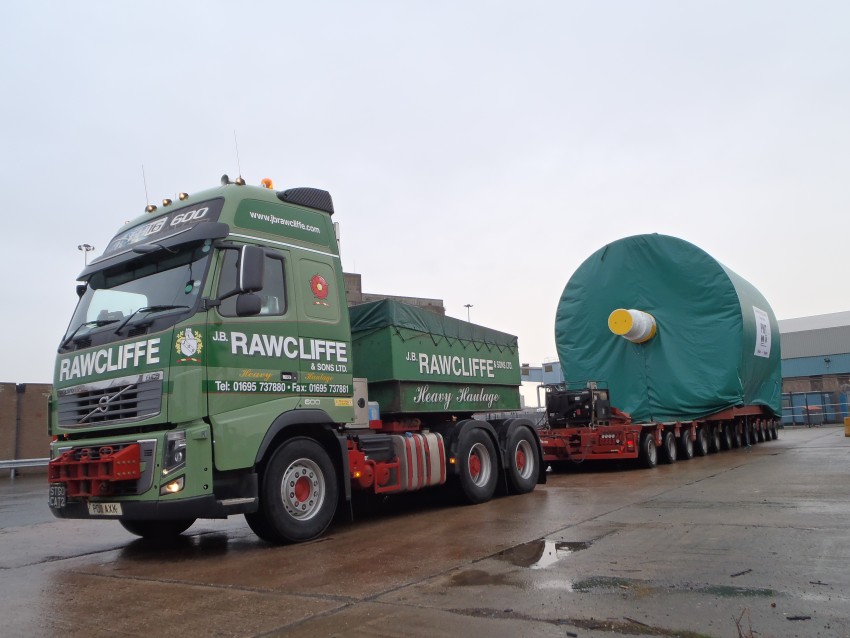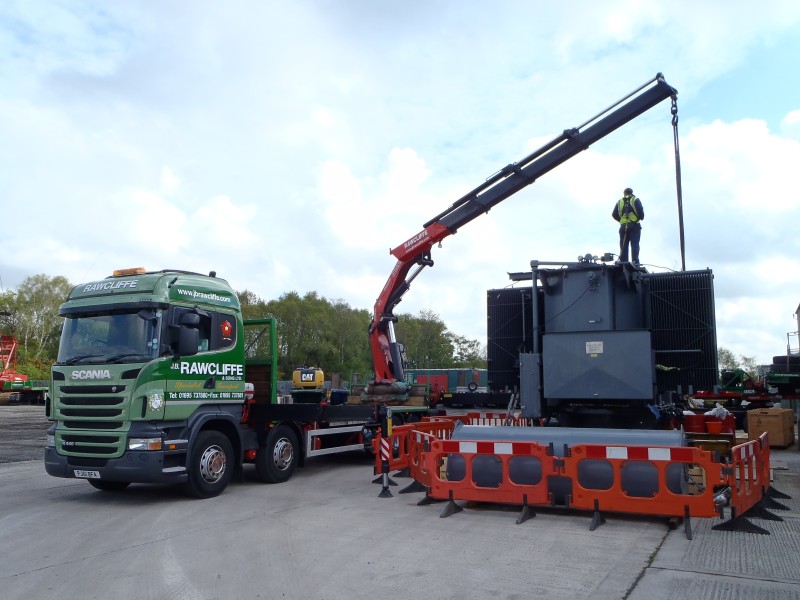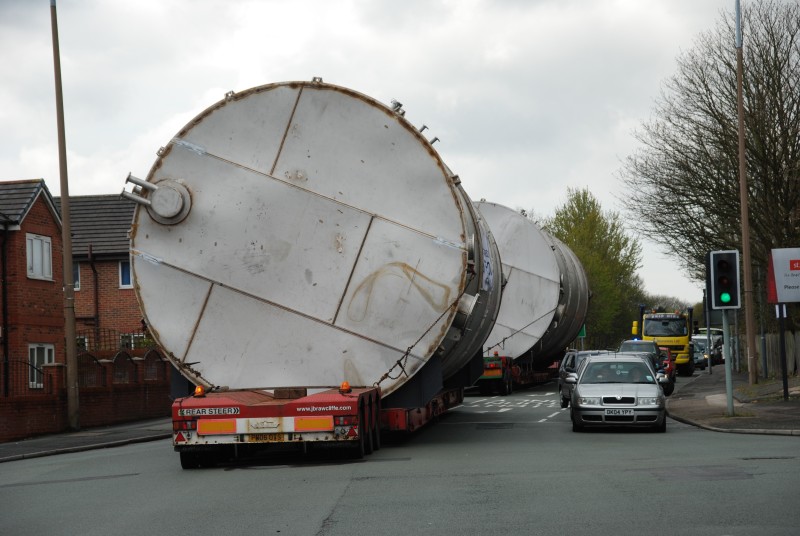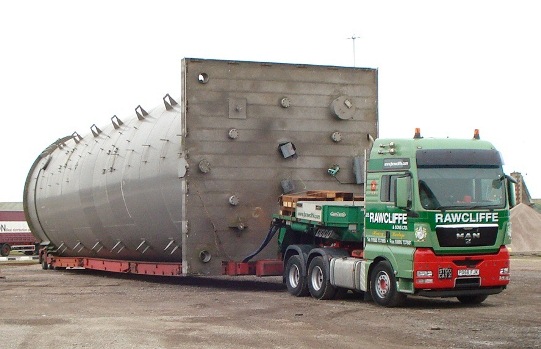Archives: Blog

Heavy Haulage – What Is It?
Abnormal load movement is required to transport large objects like wind turbines to their destination. The movement of this freight is known as ‘heavy haulage’.
Heavy haulage is a more complex process than simply transporting something from A to B.
It requires a lot of planning, specialist equipment and expert drivers with experience and knowledge of safe heavy lifting.
In this blog, we’ll explore heavy haulage, the lifting services haulage firms offer and how this benefits the industries using them.
What is heavy haulage?
Heavy haulage refers to the movement of abnormal or oversized loads which can’t be dismantled and transported using standard logistics and distribution.
It requires the use of a specialist heavy haulage firm that can plan the transport of these heavy loads around the UK, and abroad.
Unlike regular haulage, which is simply the transport of structures from one place to another, heavy haulage requires more planning (including pre-planning the safest driving routes and organising escort vehicles) to ensure freight arrives safely.
What services do heavy haulage companies offer?
Although heavy haulage typically refers to the transport of abnormal loads, most heavy haulage companies also provide other logistical services too.
They include:
Abnormal load haulage
Transporting heavy and wide loads requires more preparation and expert transit methods to move the freight safely.
Experienced and established haulage firms plan the best route, arrange a private escort to protect the heavy freight and create a lift and loading strategy.
Machine operating systems, cargo handling and haulage
Awkward, heavy loads such as storage containers and excavators need lifting by specially designed haulage machinery.
For example, sophisticated vehicles such as mobile cranes and hydraulic gantry lifts are used by haulage companies to load cargo onto lorries, trailers, and trucks.
Trained operators will control the machinery and plan and navigate the whole lift to avoid damage.
Jacking
In areas with limited space, a crane may not be viable. Instead, heavy haulage firms will plan an alternative loading method, such as jacking.
Jacking systems use hydraulic jacks to raise the freight vertically from the ground onto a skid track, which skates the load horizontally onto the truck or trailer.
Heavy goods storage
Established haulage companies offer storage at their facility to keep bulky, awkward loads until the client can collect them.
A business may require storage to house large structures whilst moving between sits or after salvage recovery.
Vehicle salvage recovery
Accidents happen, and even the most accurately planned logistics can go wrong.
Events out of our control, such as unsighted debris, may cause haulage vehicles to lose control and cargo to fall.
The most credible heavy haulage firms provide an accident salvage and recovery service to recover loads as safely and promptly as possible.
Hauling companies have specialist lifting equipment and the knowledge to raise fallen cargo from the ground and onto a recovery vehicle whilst preventing further damage.
Industries that use heavy haulage services
Professional heavy lifting services and logistics are used across multiple sectors. These industries include:
Wind energy sector
Due to environmental commitments made by the government to create more sustainable energy, the wind energy industry is growing across the UK.
The Global Wind Energy Council (GWEC) found that global wind power projects have “quadrupled in size over the last ten years”.
Only heavy-duty lifting machinery operated by haulage firms can lift and carry heavy turbine parts to their rural destinations.
An experienced company will select the vehicle most capable of safely manoeuvring across unstable off-road hillsides, grass, sand and cliffsides.
Shipyards and ports
Abnormal loads, such as iron shipping containers are raised and loaded at ports.
Other weighty objects like ships and yachts need to be lowered and raised into docks at shipyards.
Experts in haulage have the know-how and specialist equipment to plan and execute these lifts accurately, reducing the risks of accidents.
Civil engineering and construction
Construction firms rely greatly on specialist machinery and transport provided by haulage companies.
Trusted heavy haulage firms support building projects by transporting heavy materials or machinery like forklifts and excavators.
Aviation
The Aerospace Industries Association concluded that in 2020, the aviation market reached $298 billion in value, a trend that continues to rise at a rate of 7.7%.
As the aerospace market grows in value and expands rapidly, plane manufacturing has increased.
Heavy aircraft cabins and engines are transported across the UK by haulage firms who plan the transit thoroughly.
Agricultural sector
Combine harvesters and slurry tanks are large and delicate objects that require a heavy haulage team to transport them.
Heavy haulage firms have the experience and machinery to do this safely without interfering with routine farming.
Hire a reputable heavy haulage firm
Lifting and loading fragile abnormal loads should only be planned and executed by experienced professionals with specialist knowledge and machinery.
Abnormal load handling and logistics is a delicate operation that can result in accidents and damage to freight if not planned thoroughly.
To avoid destruction to loads, only engage the services of a reputable firm with plenty of years of experience.
Contact JB Rawcliffe, trusted experts in heavy haulage
We have over thirty years of experience handling and transporting heavy loads, so you can be sure your freight is in safe hands with JB Rawcliffe.
To get in touch or request a free quote, call us on 01695 737880 or fill in our online contact form

The Benefits Of Using HIAB Crane Hire
When it comes to haulage, HIAB cranes lead the way in terms of convenience and versatility. These powerful machines are fantastic and offer much more than other cranes on the market.
In this blog, we’ll explore what makes a HIAB crane so special, and why you should consider hiring one for your project.
What is a HIAB crane?
When talking about HIAB cranes, we are referring to lorry-mounted cranes. HIAB, short for Hydraliska Industri AB, is a Swedish brand name that has become synonymous with lorry-mounted cranes over time.
As the name suggests, it’s a crane fitted on a truck that has transformed haulage operations across multiple industries: such as construction and shipping. Workers can reap the benefits of a two-in-one lorry and crane as it lifts, transports goods, and hauls heavy loads across site.
There are two types of HIAB cranes available, the rigid HIAB and the articulated HIAB.
What’s the difference between a rigid HIAB and an articulated HIAB?
Within the haulage industry, there are two HIAB models available: the rigid HIAB and the artic HIAB. Both use their lorry’s engine to power the crane hydraulics, but there are subtle differences between the two.
A rigid HIAB is an all-in-one structure with the crane fixed at the rear or front of the vehicle.
They’re nimble and can fit into tight spaces as any trailer attached is removable. A rigid HIAB is best for operations in a smaller, condensed yard.
An articulated HIAB has the crane mounted behind the lorry cab and can capably perform a tandem lift. This is where two artic HIABs work together to lift even heavier loads.
Articulated HIABs are best for those projects that require extra heavy lifting and loading.
Both cranes boast a long reach to lift around obstructions, have precision controls for more accurate lifting and have more payload room for loading.
At JB Rawcliffe, we operate a fleet of HIAB cranes, meaning we’ll have one perfectly suited to your project.
What is a HIAB crane used for?
HIAB cranes are highly versatile due to their all-in-one loading and lifting capacities, making these cranes a popular choice across multiple industries.
Haulage and logistics
HIAB cranes are ideal for lifting and transporting loads across the UK. Heavy, wide appliances that can’t be lifted by a forklift can be transported using a HIAB. They include hot tubs, boats, and heavy machinery such as excavators.
Construction
HIAB cranes are frequent at construction sites as they can lift, and transport heavy loads needed for building projects.
Examples of materials/structures that HIAB can lift, and carry include porta cabins, building materials such as bricks and timber, generators, railway tracks, heavy piping, and metal structures.
Container yards and ports
You’re likely to come across a HIAB at a container yard. This is because they can lift heavy shipping containers, load heavy objects into containers, place them around site, and transport them across the country.
Skips and recycling facilities
It’s not just glass and plastic that gets disposed at skip yards and recycling plants. Big bulky appliances such as fridges and washing machines can be left too. HIAB cranes are used to haul these objects as well as lift skips and containers.
The benefits of HIAB crane hire
The unique selling point, (USP) of a HIAB is that you get two features all in one; it can lift AND transport goods.
So, what are the other benefits of HIAB crane hire?
Fewer vehicles needed on site
The two-in-one package HIAB cranes offer means that there’s no need for extra vehicles on site.
This crane takes care of site logistics, meaning that stand-alone trucks are not needed, freeing up space in the building yard.
No need for a stand-alone crane
With a HIAB doing all the lifting, a stand-alone tower crane isn’t always necessary on-site. This saves money as only one machine is required, saving space around site too.
Compact in nature
Unlike large, traditional cranes, HIAB cranes are compact and can squeeze into smaller congested areas on site for a more accurate lift.
This attribute makes them perfect for urban construction in cities that are tight for space.
Precision lifting
HIAB cranes boast a long reach, enabling the crane to lift and load from the most suitable distance. In addition, thanks to a 180° rotation, lifting is even more precise.
Perfect for tight deadlines
As HIAB cranes usually don’t require dedicated road closures for loading and transporting, they are excellent for short-notice projects and narrow deadlines.
Consider a HIAB crane for your upcoming projects
HIAB crane hire can help your project run more efficiently by combining hauling and transportation capabilities. Not only will this free up more space on your site, but it helps to make site operations more convenient.
Make your life easier by opting for HIAB crane hire with JB Rawcliffe. It’s a brilliant way to reduce your overall costs and ensure that your deliveries and lifts run smoothly.
Contact our experts today to discuss your project requirements. You can call us on +44 (0)1695 737880, get in touch via our online enquiry form or email us at enquiries@jbrawcliffe.com

How Do Transport Companies Plan Routes For Abnormal Loads?
Every day, transport and logistics companies are seeking ways to improve the efficiency of their routes and schedules, especially with the rising fuel costs.
Whilst it’s crucial that hauliers have a fleet of specialist vehicles at their disposal – ready to be dispatched at a moment’s notice – they also need to determine a suitable hauling method for oversized (abnormal) loads.
Taking the time to plan and execute the logistics for abnormal load transport will ensure goods reach their end destination safely and on time. However, there are a few factors that need to be considered when it comes to route planning.
Let’s take a closer look at these.
What type of load needs moving?
To identify the best truck for the job, haulage companies need to assess the shape, size and weight of the load that needs moving.
Armed with the basics, they can then decide on a suitable route to take – making sure there are no obstructions (i.e. low bridges, narrow streets, parked cars, etc.) along the way. This will ultimately ensure the safety of your cargo, the driver, other road users and pedestrians.
When does the load need to be moved?
Whether you need to transport goods within the UK or to destinations overseas, it’s a sensible idea to consider the time of year.
For example, if you need to move machinery in December – ready for the new year – bear in mind that the roads will be much busier as people travel home to spend the festivities with their loved ones.
Similarly, when transporting an abnormal load in adverse weather conditions, hauliers are likely to drive slower and take more frequent breaks, especially when making long journeys. Taking additional precautions, as such, is likely to increase the time it takes for goods to arrive, but the risk of accidents and injuries will be significantly less.
Is a vehicle escort required?
Depending on the type of load you need to move, you may need to notify the police, highway authorities and bridge and structure owners.
Although a vehicle escort is not compulsory for abnormal load transport, when planning the route and executing the logistics, your chosen haulage company may recommend using an escort service.
Escort vehicles can either ride ahead to ensure the route is safe for the long or wide vehicle, or behind to help control passing traffic. Either way, they will alert other road users to the presence of an abnormally large load.
Make JB Rawcliffe your first choice today
Whether you need to move heavy, industrial machinery or portacabins that are too wide to fit on a conventional lorry, JB Rawcliffe can handle it all!
We have specialised in abnormal load transport for many years and guarantee a professional solution for all clients. We use only the most reliable vehicles to transport unusually large loads across the country and beyond.
Our team will always conduct a route survey to ensure it’s safe for your goods to be transported. And when planning the route for abnormal loads, we can arrange a private escort service, if necessary.
To find out more about the services we provide and what’s involved in route planning, give us a call on 01695 737 880.

Benefits Of Using Vehicle Escort Service For Abnormal Load Transport
Do you need to transport an abnormal load?
Whether it be a train carriage to a railway station, a new aircraft to the airport or an industrial machine to a factory, the team at JB Rawcliffe & Sons can help.
As a leading transport company in the UK, we will make sure that your load reaches its end destination safely and on time.
But the question is, do you need to take advantage of a vehicle escort service?
Let’s take a closer look at the importance of escort vehicles for abnormal load transport and their benefits.
What is an escort vehicle?
An escort vehicle often rides ahead of the vehicle transporting the load to check the route is suitable. However, in some cases, it may drive behind to control passing traffic – ensuring they give a wide berth when overtaking.
The purpose of a vehicle escort is twofold. It alerts road users to the presence of an abnormally large load so they can adjust their speed accordingly – reducing the risk of accidents – and allows the driver to navigate the route in the safest way possible.
Most escort vehicles are equipped with flashing beacons and they can drive for help or raise the alarm in an emergency.
Is a vehicle escort strictly necessary?
Abnormal loads don’t always need to be escorted. However, depending on the load you’re transporting and the route it will take, the police force and local authorities may suggest otherwise.
Arranging a private escort for your abnormal load will help to keep your goods that little bit safer, which is especially ideal if they need to be transported on busy motorways or areas with restrictions such as overhead cables, low bridges, narrow streets or parked cars.
3 reasons to use an escort for abnormal load transport
- Alert other road users – sometimes, it’s not always obvious that a vehicle is carrying an abnormal load. For example, it may hang slightly over into the second lane on the motorway or be slow-moving.
Without an escort, passing motorists can easily misjudge the space available and collide with it, causing damage to the load itself and/or the vehicle transporting it – not to mention damage to their own vehicle.
- An extra pair of eyes and hands – whether it be to identify potential challenges along the way, seek help in an emergency or stay with the load until assistance arrives, having a trained and experienced person close behind or just ahead can be a real boon.
When the load arrives at its destination, it’s also helpful to have an extra pair of hands to help with loading and unloading the goods – especially if they’re fragile or difficult to handle.
- Seek approval faster – often, the police and authorities will look favourably on your route if you take advantage of a vehicle escort service. This is because you reduce the risk of accidents and injuries by making sure the route is carefully planned out – factoring in any potential challenges or obstacles on the way.
Arranging for your abnormal load to be escorted will give you the peace of mind that it will reach its destination safely and efficiently too.
Contact JB Rawcliffe & Sons to find out more about abnormal loads
Here at JB Rawcliffe, our team are experts in abnormal load transport and will ensure that every aspect is taken care of properly.
We will work closely with you to establish the most suitable haulage solution for your needs – taking into account the goods you need to transport and your timescale.
To discuss your requirements in more detail with the team, and reap the benefit of a private vehicle escort service for abnormal load transport, give us a call on 01695 737 880 or email enquiries@jbrawcliffe.com.
Benefits Of Using Vehicle Transfer For Abnormal Loads FAQs
Yes, a vehicle escort is provided if required as part of our heavy haulage service, meaning you won’t have to hire an escort vehicle separately.
Our private escorts ensure other road users are alerted to the presence of a slow-moving load, make sure the driver is aware of tight bends and is on hand to call for help in the unlikely case that an accident occurs.
Not all abnormal loads require a vehicle escort to get from A to B safely – we will use the size requirements outlined by National Highways to determine if your abnormal load requires a private escort.
Loads below 4.12m wide, 30m long and 100 tonnes don’t legally require an escort vehicle.
We have over 45 years of invaluable experience planning vehicle escort routes and executing safe heavy haulage transportation - so you can be sure your load is in safe and knowledgeable hands.
Over this time, we have planned vehicle escorts for loads of all shapes and sizes that have reached their destination safely and securely.
The safety of our drivers, other road users and your load is incredibly important to us - this is why we rigorously plan all our routes.
We perform load movements according to the official guidelines for escort vehicles set out by National Highways, the body responsible for maintaining our roads.
For example, all our vehicles meet the lighting and signage requirements outlined in the code of practice.
JB Rawcliffe will notify local authorities and police forces that an abnormal load is being transported, increasing the likelihood that the haul gets approved.
There are several compelling reasons why you need an escort vehicle whilst hauling heavy loads across public roads.
1. Escort vehicles alert road users to the presence of a slow-moving abnormal load, reducing the chances of accidents - motorists can adjust their speed in plenty of time and are less likely to overtake dangerously on tighter country roads.
2. If an accident occurs, the escort convoy can raise the alarm and call for help if the lorry driver is hurt.
Whilst waiting, they can stay with the vehicle protecting the load and alerting other road users to the upcoming obstacle by placing cones.
3. Escort vehicles alert the load driver to upcoming dangers that must be approached carefully, such as tight and sharp bends. The vehicle also alerts oncoming traffic to the upcoming lorry with a flashing amber light, meaning they can approach cautiously.
4. Using a vehicle escort demonstrates responsibility and commitment to the safety of other road users to police forces and local authorities that are more likely to approve the haul.
It’s a legal requirement to have an escort vehicle if abnormal loads exceed particular dimensions and weights.
National Highways code of practice states that if an abnormal load meets the following criteria, it will require a vehicle escort;
• If the vehicle or load width exceeds 4.1m for roads and 4.6m for motorways, it requires an escort vehicle.
• Loads reaching 30.5m long will need a vehicle escort, except on motorways.
• If vehicle gross weight exceeds 100 tonnes for roads and 130 tonnes for motorways.
Police forces have the right to vary these measurements and have the final say on whether a load requires an escort vehicle.
For further information regarding our abnormal load transport services, feel free to call us on 01695 737880 or email us at enquiries@jbrawcliffe.com
